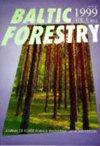The Effects of GA3 and Storage Time on the Germination of Epigaea gaultherioides (Ericaceae) Seeds
IF 0.6
4区 农林科学
Q3 FORESTRY
引用次数: 0
Abstract
Turkey is a country with diverse plant species and has significant potential in landscape planning. Epigaea gaultherioides (Boisse et Bal.) Takht. is a relic of the Black Sea (Euxine) province, aesthetic, and functional species indigenous to Northeastern Turkey and under the threat of extinction. The species should be cultured to ensure the permanence of the species with ex situ methods and employed in landscape planting design. The present study aimed to determine the effects of gibberellic acid (GA3) and cold storage time on seed germination performance in E. gaultherioides. Cold storage was applied to the seeds at +4 ºC for 16 and 28 months and subsequently the seeds were soaked in GA3 (0, 100, 500 and 1,000 ppm) solutions for 24 hours. The findings indicated that E. gaultherioides seeds that were not treated with GA3 solutions did not germinate. However, it was determined that germination was low in seeds treated with 500 ppm GA3, and 80% of the seeds germinated when treated with cold storage at 25 °C (24 h dark) for 16 months. The ANOVA revealed that there were statistically significant differences between germination percentage and mean germination times for various gibberellic acid doses and cold storage – time processes. Keywords: cold storage time, germination rate, gibberellic acid, landscape, relictGA3和贮藏时间对高穗木香种子萌发的影响
土耳其是一个植物种类繁多的国家,在景观规划方面具有巨大潜力。高叶Epigaea gaultherioides(Boisse et Bal.)Takht。是黑海(尤辛)省的遗迹,具有美学和功能,原产于土耳其东北部,正面临灭绝的威胁。应采用迁地方法对物种进行培养,以确保物种的永久性,并在景观种植设计中使用。本研究旨在测定赤霉酸(GA3)和冷藏时间对高穗毛霉种子发芽性能的影响。将种子在+4ºC下冷藏16个月和28个月,随后将种子在GA3(0、100、500和1000 ppm)溶液中浸泡24小时。研究结果表明,未经GA3溶液处理的高穗假丝酵母种子不会发芽。然而,经测定,用500ppm GA3处理的种子发芽率较低,当在25°C(24小时黑暗)下冷藏16个月时,80%的种子发芽。方差分析显示,不同赤霉酸剂量和冷藏-时间过程的发芽率和平均发芽时间之间存在统计学上的显著差异。关键词:冷藏时间、发芽率、赤霉酸、景观、遗迹
本文章由计算机程序翻译,如有差异,请以英文原文为准。
求助全文
约1分钟内获得全文
求助全文
来源期刊

Baltic Forestry
农林科学-林学
CiteScore
1.60
自引率
0.00%
发文量
23
审稿时长
>12 weeks
期刊介绍:
The journal welcomes the original articles as well as short reports, review papers on forestry and forest science throughout the Baltic Sea region and elsewhere in the area of boreal and temperate forests. The Baltic Sea region is rather unique through its intrinsic environment and distinguished geographical and social conditions. A temperate climate, transitional and continental, has influenced formation of the mixed coniferous and deciduous stands of high productivity and biological diversity. The forest science has been affected by the ideas from both the East and West.
In 1995, Forest Research Institutes and Universities from Estonia, Latvia and Lithuania
joined their efforts to publish BALTIC FORESTRY.
 求助内容:
求助内容: 应助结果提醒方式:
应助结果提醒方式:


